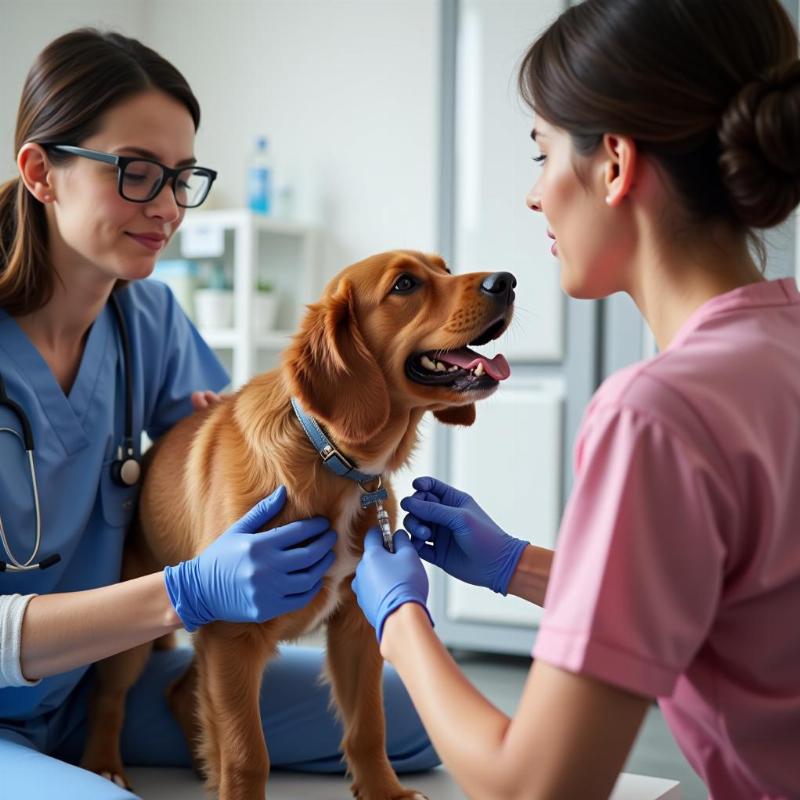Oxytocin, often referred to as the “love hormone,” plays a crucial role in canine social bonding and behavior. While it can be beneficial in certain situations, understanding the maximum dose of oxytocin in 24 hours for dogs is vital for their safety and well-being. Administering oxytocin incorrectly can lead to adverse effects, so it’s essential to consult with a qualified veterinarian before considering its use. This article will explore the appropriate usage of oxytocin in dogs, potential risks, and emphasize the importance of professional veterinary guidance.
Understanding the appropriate use of oxytocin requires a nuanced approach. It’s not a simple matter of determining a “maximum dose” without considering individual factors like the dog’s size, breed, and underlying health conditions. Furthermore, the reason for administering oxytocin significantly influences the appropriate dosage. For example, oxytocin is sometimes used to facilitate milk letdown in nursing mothers or to aid in uterine contractions during labor. In behavioral contexts, it may be considered to address anxiety or aggression, but this requires careful evaluation by a veterinarian.
Understanding Oxytocin Use in Dogs
Veterinarians may prescribe oxytocin for specific medical reasons, such as inducing labor, managing postpartum complications, or addressing milk letdown issues. Its use in behavioral modification is less common and remains an area of ongoing research. It’s crucial to remember that oxytocin is a prescription medication and should never be administered without direct veterinary supervision. Improper dosage can have negative consequences, so relying on a veterinarian’s expertise is paramount.
 Administering Oxytocin to Dogs
Administering Oxytocin to Dogs
Potential Risks of Oxytocin Overdose
While oxytocin can be beneficial when used appropriately, exceeding the recommended dose can pose risks. Potential side effects include vomiting, diarrhea, and changes in heart rate. In pregnant dogs, an overdose can lead to uterine rupture, a life-threatening condition. Therefore, precise dosing based on a veterinarian’s assessment is critical. Never attempt to self-medicate your dog with oxytocin.
Why Veterinary Guidance is Essential
Determining the correct oxytocin dosage for a dog requires a veterinarian’s expertise. They will consider the dog’s individual characteristics, the specific reason for administering oxytocin, and potential interactions with other medications. Attempting to determine the dosage yourself can be dangerous and potentially harmful to your dog. Always consult a veterinarian before administering any medication, including oxytocin.
Finding a Qualified Veterinarian in the US
Locating a qualified veterinarian in the US is easy. Resources like the American Veterinary Medical Association (AVMA) website provide directories of licensed veterinarians. You can also seek recommendations from local animal shelters or breeders. Finding a veterinarian you trust is crucial for ensuring your dog receives the best possible care.
Conclusion
Administering oxytocin to dogs requires careful consideration and veterinary oversight. While it can be beneficial in specific medical and behavioral situations, exceeding the recommended dosage can have serious consequences. Always consult with a qualified veterinarian before giving your dog any medication. Their expertise is essential for determining the appropriate dose and ensuring your dog’s safety and well-being.
FAQ
- What is oxytocin used for in dogs? Oxytocin is primarily used to induce labor, manage postpartum complications, or address milk letdown issues in dogs. Its use in behavioral modification is less common and requires careful veterinary evaluation.
- What are the signs of an oxytocin overdose in dogs? Signs of an overdose can include vomiting, diarrhea, changes in heart rate, and in pregnant dogs, potentially uterine rupture.
- Can I give my dog oxytocin myself? No, oxytocin is a prescription medication and should only be administered under the direct supervision of a veterinarian.
- How do I find a qualified veterinarian in my area? You can find a qualified veterinarian by checking the AVMA website, asking for recommendations from local animal shelters or breeders, or searching online directories.
- What should I do if I suspect my dog has overdosed on oxytocin? Contact your veterinarian or an emergency animal hospital immediately.
- Is oxytocin always effective for behavioral issues in dogs? The effectiveness of oxytocin for behavioral issues is still being researched and is not guaranteed.
- Are there alternative treatments to oxytocin for the conditions it treats? Yes, depending on the specific condition, alternative treatments may be available. Consult with your veterinarian to discuss the best options for your dog.
Beautdogs.us is your premier online resource for all things dog-related in the US. We offer expert advice on dog breeds, care, and products. Whether you’re a new dog owner or a seasoned expert, Beautdogs.us is your trusted source for comprehensive and engaging information. Contact us today to learn more about our services and how we can help you provide the best possible care for your furry friend. Email: [email protected], Phone: +1 501-555-7529. Visit Beautdogs.us for more expert guidance on dog care.